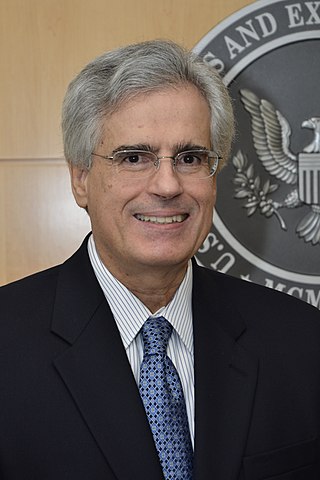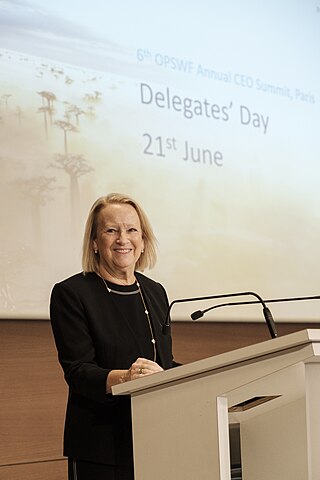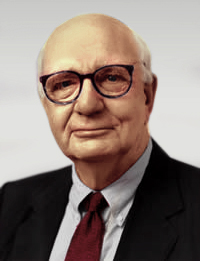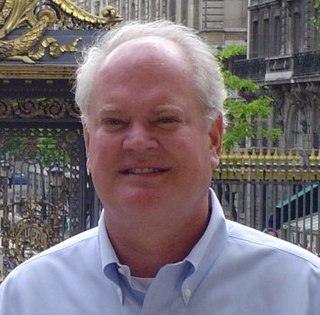Related Research Articles

The U.S. Securities and Exchange Commission (SEC) is an independent agency of the United States federal government, created in the aftermath of the Wall Street Crash of 1929. The primary purpose of the SEC is to enforce the law against market manipulation.

Nasdaq, Inc. is an American multinational financial services corporation that owns and operates three stock exchanges in the United States: the namesake Nasdaq stock exchange, the Philadelphia Stock Exchange, and the Boston Stock Exchange, and seven European stock exchanges: Nasdaq Copenhagen, Nasdaq Helsinki, Nasdaq Iceland, Nasdaq Riga, Nasdaq Stockholm, Nasdaq Tallinn, and Nasdaq Vilnius. It is headquartered in New York City, and its president and chief executive officer is Adena Friedman.
In politics, regulatory capture is a form of corruption of authority that occurs when a political entity, policymaker, or regulator is co-opted to serve the commercial, ideological, or political interests of a minor constituency, such as a particular geographic area, industry, profession, or ideological group.
The Uniform Combined State Law Examination also called the Series 66 exam is designed to qualify candidates as both securities agents and investment adviser representatives in the United States. It was developed by North American Securities Administrators Association (NASAA) and operated by the Financial Industry Regulatory Authority (FINRA).
The Uniform Securities Agent State Law Examination, commonly referred to as the Series 63, is developed by North American Securities Administrators Association (NASAA) and is administered by the Financial Industry Regulatory Authority (FINRA). The examination is designed to qualify candidates as securities agents in the United States; nearly all states require individuals to pass the Series 63 as a condition of state registration.
Uniform Investment Adviser Law Examination, also called the Series 65 exam, is a test taken by individuals in the United States who seek to become licensed investment adviser representatives. The exam covers topics necessary to provide investment advice to clients.

The International Organization of Securities Commissions (IOSCO) is an association of organizations that regulate the world's securities and futures markets. Members are typically primary securities and/or futures regulators in a national jurisdiction or the main financial regulator from each country. Its mandate is to:
The Canadian Securities Administrators is an umbrella organization of Canada's provincial and territorial securities regulators whose objective is to improve, coordinate, and harmonize regulation of the Canadian capital markets.
The North American Securities Administrators Association (NASAA), founded in Kansas in 1919, is the oldest international investor protection organization. NASAA is an association of state securities administrators who are charged with the responsibility to protect consumers who purchase securities or investment advice. NASAA's membership consists of 67 administrators from the territories, districts, and states of the United States, from Mexico, and from the provinces of Canada.

The Federal Housing Finance Agency (FHFA) is an independent federal agency in the United States created as the successor regulatory agency of the Federal Housing Finance Board (FHFB), the Office of Federal Housing Enterprise Oversight (OFHEO), and the U.S. Department of Housing and Urban Development government-sponsored enterprise mission team, absorbing the powers and regulatory authority of both entities, with expanded legal and regulatory authority, including the ability to place government-sponsored enterprises (GSEs) into receivership or conservatorship.

The Investment Industry Regulatory Organization of Canada is a non-profit, national self-regulatory organization (SRO). Established through the merger of the Investment Dealers Association of Canada (IDA) and Market Regulation Services Inc. (RS) on June 1, 2008, IIROC oversees all investment dealers and trading activity on debt and equity markets in Canada.

The Alabama State Bar is the integrated (mandatory) bar association of the U.S. state of Alabama.

Luis Alberto Aguilar is an American lawyer and former U.S. government official.

Mary Lovelace Schapiro served as the 29th Chair of the U.S. Securities and Exchange Commission (SEC). She was appointed by President Barack Obama, unanimously confirmed by the U.S. Senate, and assumed the Chairship on January 27, 2009. She is the first woman to be the permanent Chair of the SEC. In 2009, Forbes ranked her the 56th most powerful woman in the world.

The Volcker Rule is section 619 of the Dodd–Frank Wall Street Reform and Consumer Protection Act. The rule was originally proposed by American economist and former United States Federal Reserve Chairman Paul Volcker in 2010 to restrict United States banks from making certain kinds of speculative investments that do not benefit their customers. It was not implemented until July 2015. Volcker argued that such speculative activity played a key role in the 2007–2008 financial crisis. The rule is often referred to as a ban on proprietary trading by commercial banks, whereby deposits are used to trade on the bank's own accounts, although a number of exceptions to this ban were included in the Dodd–Frank law.

David George Nason is an American lawyer, government official and corporate executive from Washington, DC. He served as the president and CEO of GE Energy Financial Services, a unit of General Electric (GE) from 2013 to 2018. Previously at GE, he was the Chief Regulatory Officer and Compliance Leader at GE Capital. Nason is one of 190 GE officers globally. From 2005–2009 he served as Assistant Secretary for Financial Institutions under Treasury Secretary Henry M. Paulson, during which time he was a key architect of the federal government's response to the financial crisis of 2008.

Charles Morgan Seeger III is an American attorney, author, and international derivatives and financial markets expert. Since 1992, Mr. Seeger serves as President & CEO of Financial Markets International, Inc., (FMI) a law and economic consulting firm.
Thomas L. Krebs is an American securities and finance attorney. Krebs continues to represent the Alabama Securities Commission in select matters and maintains a private securities practice. He is recognized in The Best Lawyers in America for Securities Law.
Binance Holdings Ltd., branded Binance, is a global company that operates the largest cryptocurrency exchange in terms of daily trading volume of cryptocurrencies. Binance was founded in 2017 by Changpeng Zhao, a developer who had previously created high-frequency trading software. Binance was initially based in China, then moved to Japan shortly before the Chinese government restricted cryptocurrency companies. Binance subsequently left Japan for Malta and currently has no official company headquarters.

Mark P. Wetjen is an American lawyer. In 2011, he was nominated by Barack Obama to serve a five-year term as a Commissioner of the Commodity Futures Trading Commission (CFTC). He also served for five months as acting chairman of the CFTC upon the departure of his predecessor, Gary Gensler.
References
- 1 2 3 Eaglesham, Jean (24 January 2011). "In Alabama, Beware the Borg". The Wall Street Journal. p. C1. Retrieved 25 January 2011.
- 1 2 3 Freedman, Michael (12 August 2002). "Wall Street's Worst Nightmare". Forbes. Retrieved 25 January 2011.
- ↑ Grima, John (22 March 2005). "Successful Maltese migrants". The Times . Malta. Retrieved 25 January 2011.
- ↑ "NASAA Installs New President, Board of Directors". Goliath Business Directory. PR Newswire. 19 September 2006. Retrieved 25 January 2011.
- ↑ "NASAA Board Of Directors". About NASAA. North American Securities Administrators Association. Archived from the original on 1 February 2005. Retrieved 25 January 2011.
- ↑ IE Staff (3 October 2007). "NASAA installs new president, board of directors". Investment Executive. Retrieved 25 January 2011.